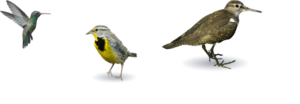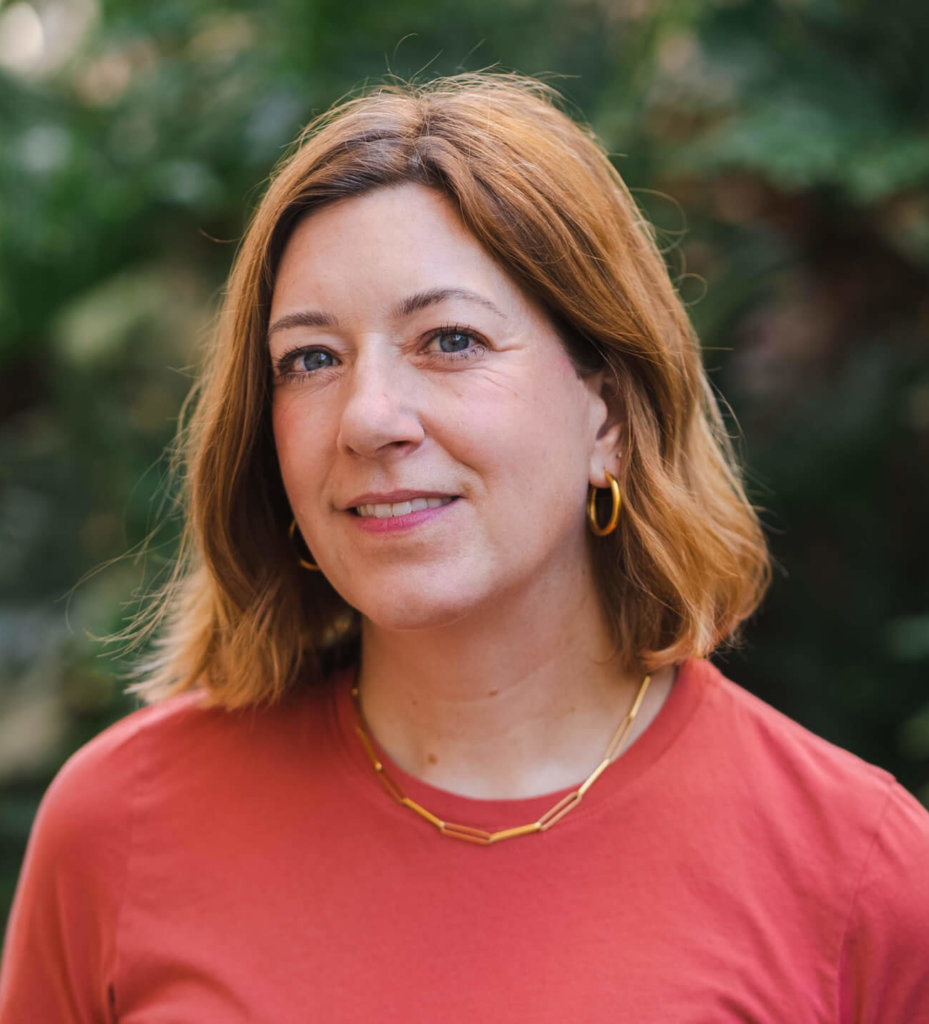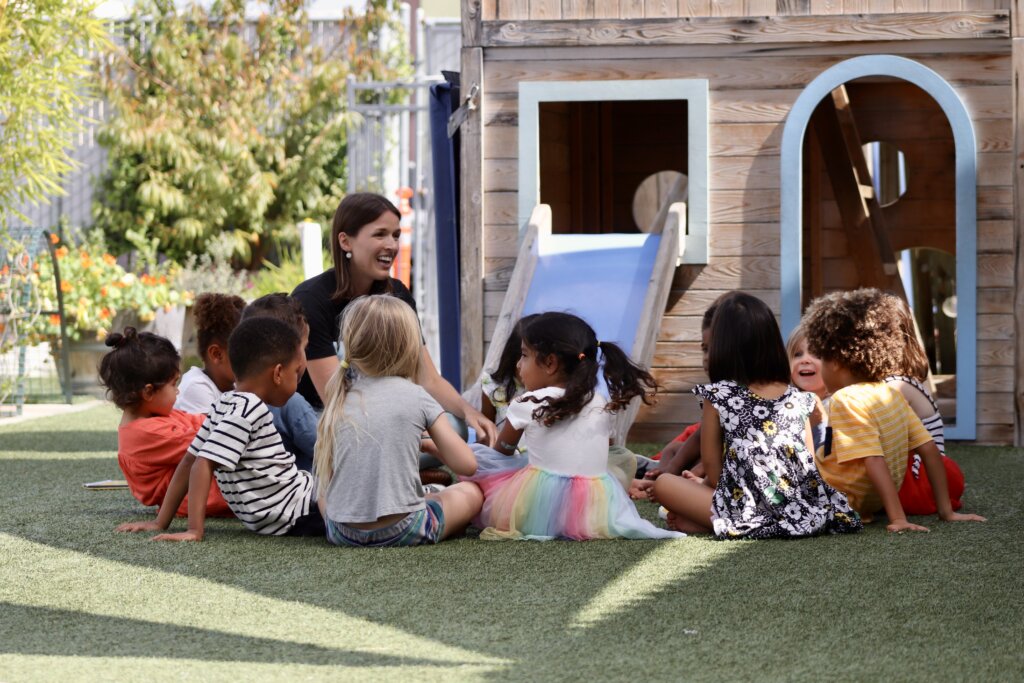Welcome to Westside Neighborhood School’s Early Childhood Center, a place where our youngest children are able to embrace their natural curiosity and drive to learn. Young children are powerful, driven to create theory, meaning, and to understand a complex and multifaceted world. At WNS’s Early Childhood Center, we scaffold this joyful exploration to take their learning ever deeper. Through rich open-ended experiences and reflection, our young children will develop into resourceful, curious and resilient adults. I look forward to sharing our unique and magical school with you.
Early Childhood Center
Preschool & dk at wns

A meaningful beginning with a collaborative approach
WNS embraces a child-centered approach to education that strives to fully develop the potential of each student intellectually, socially, emotionally, and physically. Our preschool program is play-based and rooted in social-constructivist philosophy, principles, and practices. Simply stated, we learn better together. We believe learning is a collaborative process and that play IS learning.
High-quality early childhood education provides the foundation for lifelong learning. As a community of learners, we understand that knowledge is not individually constructed, but co-constructed. Skills that foster collaboration and communication develop in our social learning environment as we play, discover, and grow together.
Welcome To The Early Childhood Center
Kelly Massey
Director of Preschool-Kindergarten

DISCOVER WNS
The Early Childhood Center
Find Your Child's Age Group

CURRICULUM
Engaging wonder through play-based learning
Through our emergent curriculum, children have a variety of opportunities to express their ideas in many languages, including drawing, sculpting, painting, music making, movement, construction, dramatic play, and shadow play. Children are able to explore their unique identities in an atmosphere of respect where each child is encouraged to share their stories and listen to each other’s voices. The environment is our “third teacher,” offering a nurturing, home-like setting with rich open-ended materials, natural light, and indoor/outdoor classrooms. Opportunities are created for children to explore their natural world, inside and outside. Our Early Childhood Center is filled with creative energy and caring spaces designed with children in mind.
The ECC At A Glance
Full Day Program
Monday through Friday, with optional early drop-off and After-Class Enrichment (ACE) program for after school.
State of the Art Facility
Small Classes
A ratio of six to eight students per teacher, with two co-lead teachers per classroom.
Social-Constructivist Learning
Reggio-Inspired
Matriculation to K-8
Explore The Curriculum
2.5-3 Year Olds
Our primary intention for our youngest children is for them to begin to make connections between written and spoken-word in ways that are contextual and meaningful to them.
To support this, we model reading and writing through story dictation, story play, letter writing and any other ways that children can see their thoughts and words being put into written language. In addition, we cultivate phonemic awareness in playful ways through rhyming, songs, and story plays.
Key Words – supports meaning making and name recognition.
Play Plans – children’s social dramatic play scenarios are dictated to teachers and taken down in journals to practice both executive functioning and solidifying that the written word has relevance and meaning to them.
Story Play – Children’s stories are elevated and made visible to their peers through story dictation to their teachers and then acting their stories out with peers.
Story Workshop – Children’s play and stories are dictated, written down, and revisited for further attention.
Children in this age group are developing concepts around counting, one-to-one correspondence, spatial relationships, and whole to part relationships. We support these understanding through open-ended play with blocks and manipulatives, intentional provocations at the Mathematical Thinking Area and Practical Life table, and through “planned opportunism” such as counting which friends are at school today and how many have on red shirts.
Mathematical Thinking Table
Through aesthetically pleasing and intentional provocations, children can practice pattern making, spatial relations, and one-to-one correspondence.
Construction Area
Children have many open ended ways to explore whole to part relationships and gain physical knowledge through work with unit blocks. Through use of the correct names for each block, such as unit, half unit and double unit, children learn through experimentation and reflection basic geometry, addition, and fractions.
Practical Life Table
Two and three year olds are offered real life materials to scoop, measure, sort, and organize.
In the first year the children are learning how to be in a group play environment at school. One of their first tasks is to build trust in their teachers as new caregivers.
The children are working on basic peer communication and social skills, asking friends for materials, waiting their turn, communicating their needs, and empathizing with members of their community.
The following skills are woven into their daily life at school during Morning Meeting, Small Groups, nap time and outside play time:
- Identifying emotions in themself and others.
- Self regulation
- Learning to express ideas and emotions to peers and adults
- Understanding oneself to be a contributing member of a community.
- Identifying and respecting differences in ability, skin color, heritage, family culture, family structure, etc.
As children become more skilled at conflict resolution, the Peace Carpets are introduced, often brought out independently as a way to stick with a problem until everyone feels heard.
3-4 Year Olds
Three and four year olds are beginning to recognize written language in the form of letters and words. They are beginning to feel confident in writing their name and are willing to practice writing words and ideas that are meaningful to them.
We support the children’s emerging understanding of the connection between letters and sounds by intentionally sounding out the words as we take dictation in journals and in Story Play.
We continue to model reading and writing for children in the form of story dictation and writing letters to parents and peers.
Key Words – Children more readily ask for new relevant words added to their ring. They have a greater sense of the sounds that letters make and the value of the written word.
Play Plans – Children are invited to write names and characters on their own.
Story Play – Children add words and names to the teacher’s transcription of their story play.
Story Workshop – Book making, writing and reflection become a larger part of this practice.
Three and four year old children are able to recognize number symbols, are confident counting and are ready for more complex sorting and measurement. We push the children to think harder by introducing coding and algorithmic thinking in games and classroom practices.
Mathematical Thinking Table
More complex thought problems are introduced and questions asked such as “how many triangles will fit in this triangle?” Children are asked to measure, with both formal tools like rulers, and less formal tools.
Construction Area
As children’s constructions become more complex, we begin to ask them to plan their play ahead of time with a Master Plan, asking them to imagine ahead of time the proportions of their concept and what materials they might need.
Practical Life Table
At this stage, children are offered more complex activities that support 2-3 step direction, concentration and self sufficiency skills. This could include cutting, tweezing, tying, folding etc. These are skills that are reality-based as they work towards independence and problem solving.
Three and four year olds build on the skills of the previous year and begin to incorporate more complex vocabulary around emotion. Discussion and disagreement become a more important piece of daily life with debates becoming more prominent during meeting times. Children learn to express their ideas publicly as they make choices during Morning Meeting, share family culture during Family Shares, and gain insight from peers during Reflection Meetings.
Conversations around Small, Medium, and Large Problems are introduced as we ask children to be thoughtful about what they need help with from adults.
Self-Portrait work is introduced as children learn to closely observe their faces and make intentional choices about how they wish to represent themselves.
We continue the work of respecting and identifying differences by mixing skin color pallets, reading books that open windows into other experiences, and furthering conversations about gender and gender diversity. Persona Dolls become an instrumental tool to both represent diversity and bring diversity to the classroom
4-5 Year Olds
As children become more confident in their writing skills and independent in their work habits, we begin to incorporate Brave Writing into their repertoire. They are encouraged to problem solve the spelling of words on their own, often leaving out letters or vowels. We encourage this independence and add to rather than correct their interpretation. Children this age also become very skilled at sounding out words in books so it is important to add early readers and books that they are able to decode to your library.
Key Words are also continued for the moments when children ask for correct spelling or when a word will be accessed again and again. As teachers we work with the children to problem solve the word together, building on their brave writing skills.
Play Plans – Children are encouraged to write as many elements of their play plan as they are able.
Question of the Day – A question or topic of conversation is written on the whiteboard for the children each morning and the class sounds it out together.
Story Workshop – Children are expected to work on their published stories over time, creating the words and pictures both on their own and with the support of a teacher.
Children in our oldest classes are challenged with more formal work using number symbols to show their addition and subtraction ideas.
Manipulatives such as stones or cubes are offered specifically for children to work through counting problems. In addition, we ask children to think forward with pattern making and create opportunities for them to think algebraically.
Mathematical Thinking Table
More formal math concepts like addition and subtraction begin. Children often will be asked to count, measure and write number symbols, to represent their ideas.
Construction Area
As children become more skilled with engineering and design, we offer more materials to negotiate with. Kaplas offer opportunities to work with pattern, design and are more detailed than working with only unit blocks. Schematic drawings and Master Plans continue to be offered and children become more and more skilled at thinking forward and reflection.
Practical Life Table
Teachers should tune into specific areas that students need support in like hand/eye coordination, fine motor abilities, multi-step direction and self-help skills.
In DK, we become more focused around normalizing all kinds of experiences for the children through literature and read alouds. Ideas around gender, family structure and race become a focus as well as language around Mirror and Window Books. We become more explicit about working with children to develop a story of their identity that is continually developing and evolving.
The children’s emotional vocabulary becomes richer as we introduce more complex emotions such as embarrassment, pride, jealousy, generosity and more.
In Question of the Day, a practice introduced in the third year, we give the children the opportunity to share their own experience and practice in Whole Body Listening to hear the experiences of others. This happens during Morning Meeting on most days.
Spotlight on Math
Take a look at how mathematics and numerical concepts are introduced at the Early Childhood Center, setting children up for academic success.

Unique DK Experience
- DK students matriculate to our kindergarten program.
Children receive the academic and developmental benefits of being connected to a K-8 school. - At the same time, as the oldest children on the preschool campus, the DK students build confidence and develop leadership skills that will serve as the foundation for a lifetime.
- Incorporating academic skills in developmentally appropriate and meaningful ways to ensure kindergarten readiness.
- Small group work that targets each child’s skill level by supporting and challenging their social-emotional and academic growth.
A Day In The Life
Curious as to what a day at the Early Childhood Center at WNS looks like? Follow Niko as he takes us through his day!
Where Children Explore
Nature has given human beings the intrinsic drive to test, experiment, pretend, and create. At the Early Childhood Center, we optimize this innate desire to understand the world through rich play-based learning experiences including mixing paint colors, constructing with blocks, and creating stream beds in the sandbox. Our skillful teachers create environments that support meaningful play and then provide scaffolding for the children as they reflect on those experiences.
NOTICE OF NONDISCRIMINATORY POLICY AS TO STUDENTS:
Westside Neighborhood School admits students of any race, national and ethnic origin, religion, gender identity or expression, or sexual orientation to all the rights, privileges, programs, and activities generally accorded or made available to students at the school. The School does not discriminate on the basis of race, national and ethnic origin, religion, gender identity or expression, or sexual orientation in administration of its educational policies, admissions policies, tuition assistance programs, and athletic and other school-administered programs.
Early Childhood Center License Number: LIC197493426





